How do you know when you’ve written a good lyric?
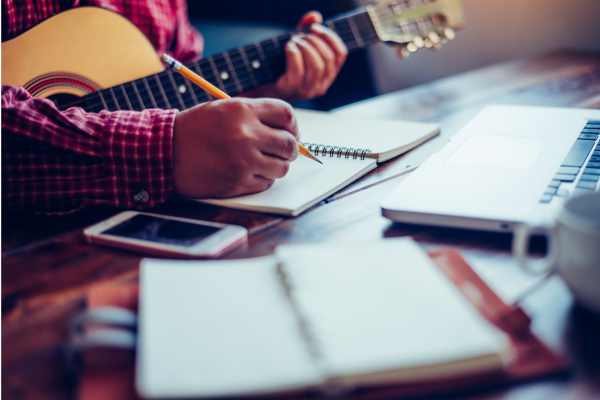
When I started out with songwriting, my approach to lyric writing was to begin with the first line of the first verse and just try to write some lines related to the mood or subject I was exploring.
Sometimes, I did manage to complete a full set of lyrics that I was reasonably satisfied with, which I kept. But - often, one of these things would happen:
I was writing from a mood or feeling, so the lyrics were vague and abstract, and if there had been no music you wouldn’t know what they were about, specifically.
And that’s if I even managed to finish the song. A mood or abstracted passage can sustain you for a section or two, perhaps, but then it becomes really hard to know what to say next. Almost every songwriter has experienced the scenario of writing a section or two and then running out of steam.
I would would write a bunch of lines, and feel a buzz for having completed a new song. Then I might return to the material the next day or at a later point and be underwhelmed by it. But I didn’t know how to define what was wrong.
In this video I explain the commonest myths we tend to carry along with us in our songwriting, and I share a simple idea that can transform your approach to lyric writing.
I had two main obstacles back then that are common to most of us: I wasn’t even aware of what was missing from the way I was going about lyric-writing, so I couldn’t define in any way what was and wasn’t working in a lyric I was unsure about. This meant I had no systematic way of revising and refining and improving drafts. I didn’t know how much of a difference some simple tweaks could make. It was a matter of - throwing the whole thing out and experimenting at random, or keeping something I wasn’t really satisfied with.
There is a subtle but significant disincentive we face when reviewing and evaluating our work: it’s very personal! It can feel extremely vulnerable committing anything to paper, and considering flaws in it afterwards can easily be too close to the ‘maybe I am useless at this and should stop’ emotional territory. So, without being fully conscious that we are doing this, we often just settle for what has come out and take that as the measure of our ability. ‘This is just my level as a lyricist’.
When you break this down, it makes no sense. This would be like someone with no experience cooking going into the kitchen, trying some random combinations of temperatures and ingredients and saying ‘this is just my level as a chef’ and repeating the experiment every time they needed to eat - as if there were no way of knowing how to improve the result.
Or getting in a car with no instruction and trying to figure out how the controls work to get the car going in the correct direction and concluding ‘well, I must just not be talented at driving’ if we crash the car into a wall.
Not only might you sometimes get a decent result and sometimes get a bad result; but also each time you go back to write a lyric, there’s the same randomness as to whether you’ll end up with something you can feel satisfied by.
Over time, this can really sap your motivation. In a worst case scenario a person might end up giving up on their lyric writing and songwriting because they don’t feel satisfied with their work and don’t have a sense of making progress.
When you don’t like something you’ve written, every time you perform it, there’s something dubious about the energy you bring to the performance and that undermines you a bit, and the audience can sense it on a subtle level. You are a tiny bit less present in that moment and it affects the connection with the audience, your enjoyment and their enjoyment.
I probably spent about a decade operating in this trial and error way until I finally started learning more about the nuts and bolts of how I could use language more deliberately. Before that, it was as if I expected that my first draft would be the best expression of my idea, every single time. If you’d asked me directly whether that was a reasonable expectation, I’d have said no. If I asked you whether you thought this was a reasonable expectation for lyrics you might write, you’d also probably say no.
But I had simply never asked myself this - no one else asked me - and I was slightly in the thrall of the idea of creative activity as being a little bit magical. (Which it IS, but not in the ‘struck by magical inspiration’ way that’s such a cultural trope).
These things were the biggest game changers for me:
There’s a path already: Realising there were frameworks that I could use to define what it was I did and didn’t like about a lyric draft, and that using these frameworks to revise my lyrics was a completely standard part of the process.
It’s not just you: Discovering that pretty much all creative struggles I had experienced over the years writing songs were not just harsh reflections on my ability, or unique to me - they were standard challenges inherent to the form that most people who write songs will encounter at some point.
There are solutions that one cannot easily deduce or learn just by repeating the same approach: I still know songwriters who are signed artists with record deals, release schedules and tours whose approach to creating their next release is to hurl themselves at the page and hope they come up with something that their fans will appreciate it. I’ve coached songwriters who had studio time booked and were panicking about how they were going to come up with material, because no matter how many years they had been writing songs, the way they went about it was the same and the results they had were inconsistent. The process is also pretty fraught if every time you start you’re not quite sure how it happens and whether you’ll ever be able to do it again.
What changes things is focusing on the fact that in a song, lyrics provide meaning information and musical information.
The meaning information includes the subject matter, how the ideas develop, and what type of language is used to express the ideas. Small adjustments to how you use language can have very big effects on what the listener experiences from the lyric.
The musical information includes melody but also rhyme scheme, stress patterns, phrase length and rhythm. Sometimes all it takes is changing a three syllable word to a one syllable word for a line to sit comfortably and an entire section to work better.
You may be thinking ‘hmmm, meaning, development, use of language, melody, sound and rhythm of a lyric…that sounds like a LOT to get across…I’m overwhelmed just considering that those things even exist!’
Of course, it takes time to acquire deep fluency in any skill area, but there are two or three simple, profound changes in perspective that don’t take a long time to absorb which you can start applying to your songwriting and lyric writing straight away.
I wish I’d known these things when I started out - and I have collected them along with a series of writing activities you can use to develop a rich creative practice in my free e-book, Five Ways To Write Great Lyrics. Even if you just read it, I promise the way you think about your lyrics will change in a way that improves your lyric writing..
Get it here - it has resources in it that will really help you elevate your lyrics.
How To Develop Musical Ideas To Create Dynamic Guitar Riffs
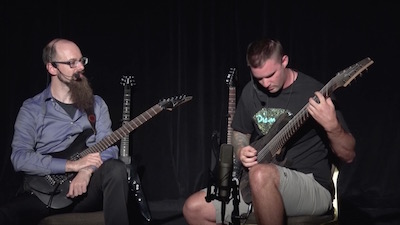
How many times have you come up with a great riff on your guitar, but the only thing you were able to do in order to "continue the song" was to simply repeat the same riff endlessly? Can you hear how great guitar players use the riffs in their song to "take the song somewhere" rather than just repeating them over and over? How do they do that?
It's a very common situation for beginning composers to write a GREAT riff... but then not be able to use it. And you can hear it: there are too many songs out there that simply repeat the same thing over and over... and over.
We should be able to do better than that.
If this happened to you, there is a very precise reason why you are not able to write the rest of the song: nobody taught you how to "think about" and "manipulate" your riff so that you can use it to create music. So of course the only resource you are left with is to simply repeat what you have.
Knowledge alone is not worth anything if you don't know how to apply it. Even if you are one of the few people who were actually taught these techniques, I bet you have never seen someone apply these techniques in real time.
But don't worry, you are about to see it. In the video below I show a student some basic techniques and then help apply them to develop one of his ideas into an interesting riff that can be used in a song. The tricks and systems I use here can be applied to YOUR songs too:
Can you hear how the final riffs are "taking the song somewhere"? And see how many options are possible? Now that you have seen it done once you are already able to apply this to YOUR riffs and ideas. Happy songwriting!
Did you find this video helpful? Do not miss the next Songwriting videos!
Subscribe to the SongWritingLessonsOnline YouTube channel by clicking the button below.
Creating Memorable Melodies By Selective Repeating
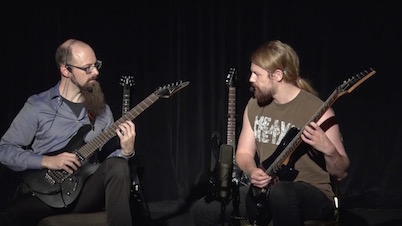
Everybody can come up with a chord progression (just pick a few chords and put them one after another). And everybody can come up with a rhythmic idea (just tap your fingers on the table). But only a few people can come up with interesting melodies. How is that?
Melodies are arguably the most important element in music. It's what everybody hears first, and what everybody remembers after listening to a song. Even from a legal/copyright point of view, melody is what makes the song - just thinks how many songs have the same chord progression... but with different melodies.
So it is quite a paradox that most teachers and books on music theory simply do not spend any time studying how to make melodies. Not only is it unfortunate for the poor students that are left to trial and error, but some malicious commenter may also advance the idea that maybe all these teachers do not know how to create a melody themselves (of course, that's not what I am saying...)
Turns out, the master composers and writers have found a number of patterns and tricks to create great melodies, and that these tricks are passed down as "secrets" from generation to generation. I'm not saying that there is a "secret musician society" per se, I'm more suggesting that some of these "secrets" are hidden in plain sight.
A comprehensive review of all these tricks and patterns will take a book or two... but I can give you ONE "secret" in 10 minutes. In this video I will show you how you can use a little intelligent repetition and create memorable melodies and licks easily.
As you can see, the idea is not new - you've definitely heard it. And yet how many songwriters and composers think of using it? How many times have YOU used this idea to write a melody? What are you waiting for?
Did you find this video helpful? Do not miss the next Songwriting videos!
Subscribe to the SongWritingLessonsOnline YouTube channel by clicking the button below.
What Instruments Should A Songwriter/Composer Know How To Play?
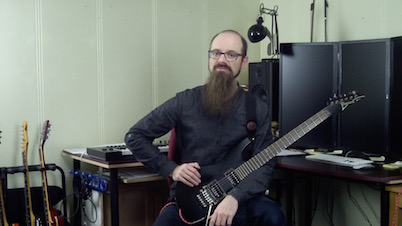
Ok, so you want to be a songwriter or a composer. Do you know what instruments you have to learn? Maybe you know already how to play an instrument and want to know if you have to learn another one, and which one? Or maybe you do not know how to play any instrument yet, and you want to know what instrument will give you the highest "composing power"?
There seems to be a lot of confusion on this topic. Can one even be a composer without knowing how to play an instrument? Does every composer have to be a virtuoso player too? Are there instruments that are "better" for songwriters? Let's make some clarity regarding all that:
Do You Need To Be Able To Play At All?
Opinions differ on this one. Can you be a proficient composer without being able to play an instrument? Let's examine the facts:
- In the Baroque, Classical, and Romantic periods of music, the vast majority of famous composers were either virtuoso of one instrument, or at least very proficient (Bach, Mozart, Beethoven, Chopin, Listz, Paganini...).
- There WERE exceptions. For instance, Berlioz was reportedly famous for not being a good piano player. Though, apparently he was quite a competent guitar player.
- In modern music there have been many songwriters who are not virtuoso, but all of them have at least a passing knowledge of one instrument (I'll tell you about an exception to this in the video below)
So it seems that YES, you do need to be able to play an instrument to be able to write music.
At What Level Do You Need To Be Able To Play?
You may think we already answered that: you do NOT need to be a virtuoso of the instrument. But this is not true: in fact you may need to be a virtuoso. Think for instance of Paganini or Steve Vai: their music would not be the same if they were not virtuoso of their instruments.
So the answer is: depends on the music you want to write. If you want to compose virtuoso pieces for a specific instrument, you need to know that instrument well yourself. Otherwise you just need to know "enough" of it to get by. As an example, the Beatles were not virtuoso players, but they were competent enough to compose and perform their own songs.
What Instruments Are Best?
Goes without saying that every instrument of which you learn the basic will give you a valuable perspective. But there is a wide consensus on the fact that not all the instruments are created equal. In fact you will get a quite complete picture of how music works knowing just the basic of only 3 instruments (and chances are that, without even realizing it, you already know one or two).
To find what are the three "master instruments" that will give you the greatest "songwriting power", watch the video below:
How many of these instruments you know already? How much (or how little) time would you need to acquire the basics of the ones you do not know? As you can see, with a minimal time investment you will get an immense return for your songwriting and composing.
So have fun with these instruments. Remember: you do NOT need to be a virtuoso to compose!
Did you find this video helpful? Do not miss the next Songwriting videos!
Subscribe to the SongWritingLessonsOnline YouTube channel by clicking the button below.
How To Get Endless Musical Inspiration And Never Experience Writer's Block
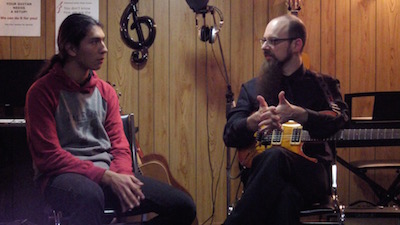
Do you think you are a creative person, or are you beating yourself because you are not creative enough? Do you think that creativity is "a gift" or something you can take care of and make grow? And if so what exactly can you do be more creative? Turns out, it's much easier than you think!
Ah, inspiration. In a previous article on songwriting practice we have seen how a songwriter needs to have both inspiration (to get original ideas) and technique (to harness these ideas into a complete song). For technique we can practice, but what to do for inspiration?
The myth that is most common today is that inspiration "just comes".
Turns out, instead, that there is A LOT you can do to make inspiration come to you.
The truth is, it's not "having" inspiration that is the problem, it's "allowing" inspiration to come up that is the problem. What do I mean with that? I suggest you try visiting your local kindergarten and observe the kids playing. You will see that many of them are singing made up songs.
Come to think of it, many of these kids are doing a lot of creative things in their daily activities. But now go and see some older kids (say, 10-12 years old) and how they play. No more made up songs. No more creative things going on (with few exceptions).
Where has all their creativity gone? It has been squeezed out of them. Not only by the school system, but by their environment in general.
The bad news is that unless you take care of your own environment, YOUR creativity will be squeezed out of you too.
The good news is that all your creativity is still inside of you... and you can still get it out. EASILY. How can you do that? See the video below where I explain to a young composer how to free his inspiration and take care of it, so that he will never have to wonder if he's a creative person or not... he'll just BE creative:
It's all about knowing how to take care of your inspiration. As long as you follow the advice that I gave you in the video above, you will never be blocked again. And if you think you are not a creative person... it's probably because you didn't follow this advice in the first place. Don't worry! It's never too late to start and the results will surprise you too.
And if you want to know more about all that and make it part of your day-to-day practice, check out the definitive guide on putting a stop to writer's block
Did you find this video helpful? Do not miss the next Songwriting videos!
Subscribe to the SongWritingLessonsOnline YouTube channel by clicking the button below.